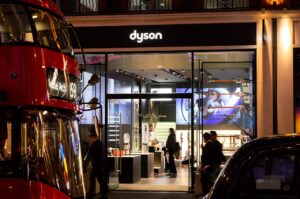The following entry is a record in the “Catalogue of Catastrophe” – a list of failed or troubled projects from around the world.
Organization: Dyson Ltd – UK
Project type : Development of an electric car
Project name : The Dyson
Date : Oct 2019
Cost : £500M
Synopsis :
The future of transportation is here to see and it is of course electric! As a result, the development of electric cars has been a growth area for the past ten years and the pace of change continues to grow.

That growth and the potential to revolutionize the car market has interested both newcomers and the incumbents alike. Of the newcomers Tesla has of course made the cut and has proven they have the stamina to stay in the game. Other start-ups and have come, gone, been resurrected and gone again. At the time of writing Rivian, Fisker and other start-ups are still in the game, but they face the monumental challenge of taking on the likes of Volkswagen, Nissan, GM and other organizations that already have the infrastructure to design, build, sell and support vehicles on a worldwide basis.
One of the recent challengers to throw in the towel is Dyson Ltd. James Dyson is one of the UK richest men. An engineer, a techie and an entrepreneur, Dyson made his fortune developing high-end home appliances (most notably vacuum cleaners). Always looking for fields in need of his engineering prowess, Dyson started down the difficult road of developing a from-scratch electric car. The jump from vacuum cleaners to cars is of course massive and the decision to invest in the project was a quantum leap of faith.
Normally such a move would require careful due diligence and active management of the downside risks. It appears, however, that as a privately owned business, Dyson took a different path. In a Mar 2020 interview with business magazine “Fast Company” Dyson was asked about the role up front market analysis plays in developing Dyson products. Dyson replied…
“We never think of the market for the product. It’s not something that guides us. We look for a problem in the product, and then we go to solve the problem. Hand dryers aren’t a particularly big market compared to hair dryers or vacuum cleaners, but that didn’t stop us from wanting to make a hand dryer. Having an interesting technology for products decides what we do, whether the market is small or big.”
To be fair, Dyson’s leap of faith did make a lot of progress and reports indicate that his nascent project got as a far as a fully functional vehicle that was near ready for production. However, as costs mounted past the £500M mark, the monumental costs of product launch came into view. Recognizing that to cover the investment and production costs the finished product was likely to have a price higher than the market would bare, the project has been canned.
Note: Dyson is a privately owned company and the cost of the project was apparently born by Mr. Dyson himself. Although Mr. Dyson can certainly afford to absorb the £500M cost, I think we should also remember the time, talent, sweat and tears of the team who work on the project. To see all of that effort wasted is a heart break in its own right. Hopefully some of the technology will still find a way forward and some of that effort will be rewarded, but as it stands, the project may not be catastrophic for Dyson, but it is likely a massive disappointment for those who vested themselves in the project’s success.
Contributing factors as reported in the press:
Lack of upfront due diligence (failure to analyze costs, market competitive landscape, market size, production costs and profit margins). Underestimation of costs. Perfectionism. Focal imbalance (focusing on the product rather than full spectrum of work need to launch a car brand).
Related stories:
- Sinclair C5 – Before Dyson there was Sinclair. Sir Clive Sinclair was another brilliant engineer and entrepreneur. In the 1980’s he too dreamed of revolutionizing transportation. His skills helped trigger the PC revolution in the 1980’s and the resulting fortune funded his interest in electric transportation. Although Sinclair may have been ahead of his time, the product was not.
Reference links: